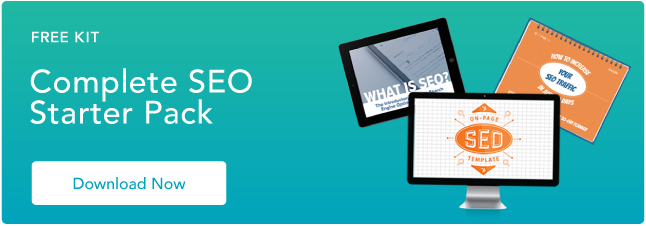Imagine this: You've done everything you can to optimize your website.

From optimizing your images and conducting keyword research to setting up a site structure and internal linking strategy.
Yet, you're still struggling to rank on Google.
→ Download Now: SEO Starter Pack [Free Kit]
It may be because you've only completed one half of the puzzle. What's the other half? Off-page optimization.
While your website is vital to your SEO strategy, there are additional actions to take outside of your website that will help you rank.
What is off-page SEO?
Off-page SEO involves all actions you take to impact your search engine ranking that fall outside of your website. This can include building backlinks, being active on social media, and guest blogging.
Search engines weigh many factors when determining a page's ranking. While some of the factors are based on website content and performance, Google also gathers its understanding of your website through sources outside of your domain. That's why off-page SEO is so valuable.
Link building, for instance – an effective off-page SEO strategy – is one of the top ranking factors. That's because Google is built on PageRank, an algorithm that looks at a page's backlinks for quantity and quality.
An off-page SEO strategy supports your website efforts (i.e., on-page SEO) and works to add credibility, relevance, trustworthiness, and authority to your domain.
On-Page SEO vs Off-Page SEO
In the simplest terms, on-page SEO encompasses every action you take on your website to affect your ranking on search engines. Off-page, on the other hand, happens outside of your website.
What actions specifically? Here's a quick visual guide:

This list isn't exhaustive, but it should provide some clarity on the difference between these two SEO strategies. The key takeaway is that both are equally important to gain and maintain a high search ranking.
Off-Page SEO Checklist
- Link Building
- Social Media
- Local SEO
- Content Marketing
1. Link Building
Links from other sites on the web server as votes of confidence in your domain.
The more votes you get, the more likely you'll rank on search engines. Conversely, the fewer votes you have, the harder it will be to convince Google that you're a trustworthy, authoritative site.
You need other pages to vouch for you — that's what backlinks do. Building an external link is an off-page strategy that should be number one on your list.
There are several types of links you can gain:
- Natural or earned links, in which editorial publishers or consumers mention your brand organically.
- Built links, which require some effort on your end, such as reaching out to publishers for link attribution or mention.
It's important to use white hat strategies to gain backlinks, as methods like flooding forums and comment sections with links to your webpage can get you penalized by Google. For creative ways to gain backlinks, check out this backlinks strategy guide.
You can also jump to this section where we cover what to look for in a backlink opportunity.
2. Social Media
You've probably thought of social media as a brand awareness tool, more than an SEO play.
But social media is a great way to gain domain authority and increase your search engine ranking.
When you share content on social media and direct traffic to your website, it shows Google that you're gaining traffic from diverse sources and must have interesting high-quality content.
This is why it's important to consistently engage your community on social media and use it for content distribution. More engagement will likely result in more shares, backlinks, and clicks, which helps build domain authority.
3. Local SEO
Local SEO is a strategy that involves optimizing a site for local search results. This is typically used for brick-and-mortar businesses or those that serve consumers in specific geographic areas, such as hair salons, air conditioning companies, or supermarkets.
For this to work, you must send signals to search engines that service consumers in local areas. How do you do this? Here are few key ways:
- Add your company to local and national business directories, namely Google My Business.
- Claim your listing on review sites, like Trip Advisor and Yelp, and respond to reviews.
- Encourage your customers to leave positive reviews online.
- Have consistent contact information across all digital platforms
For a comprehensive guide on local SEO, check out this article.
4. Content Marketing
Content marketing helps you reach your target audience and attract them with information that addresses their needs and pain points.
In addition to your on-page content marketing efforts, like blog posts, you can also leverage methods like guest blogging, downloadable offers, surveys, and reports.
These practices are great ways to drive traffic to your website, generate new leads, and improve your search engine ranking.
Take guest blogging, which offers multiple benefits. The first is the ability to reach a new audience that falls within your target market. The second is the value of the backlink you can earn by being published on another high-authority domain. Lastly, guest blogging can earn you more website traffic — another important ranking factor.
Off-Page SEO Factors for Link Building
Over the years, Google and other search engines have gotten stricter in what actions they reward and penalize. Once everyone knew link building was a key ranking factor, people were using all kinds of strategies to get backlinks. From posting their links on forums to paying for links.
Then, search engines wised up and started penalizing the use of unethical or unnatural link placements. Today, here's what you'll want to consider when developing your link building strategy:
- The number of referring domains – The more domains you have directing to your website, the more votes of confidence you have, according to Google.
- Link authority – It's not enough to have a lot of referring domains, you want to be referenced by domains with high authority.
- Relevance – The link needs to be relevant to your site. Say you're a pet toy company. A link from the National Dog Association weighs more than one from a lifestyle blogger.
- Anchor text – The specific text that's hyperlinked and points to your website should be descriptive and relevant, without sounding spammy.
What to Look for In Off-Page SEO Tools
So, you want to work on your off-page SEO strategy and you need a tool. Before you pick out a tool, it's important to know what features you should be looking for.
The first thing you'll want to look for is an SEO tool that includes a backlink checker. It should offer details on your referring domains, anchor texts, their linking authority, and more.
SEMrush, for instance, has a backlinks analytics tool that allows you to compare your website to your competitors and identifies areas of improvement.

You'll also want to look for a tool with a brand monitoring feature. HubSpot's Social Media Management Software allows you to track your brand mentions as well as your competitors'.

This complements the CRM's SEO Marketing Software, with on-page SEO features like the website audit and recommendation, topic development, and keyword data tools.

In addition, look for an SEO tool that makes identifying good guest blogging opportunities easy. For instance, the MozBar extension from Moz allows you to get instant metrics on any webpage and determine if it could be the right fit for you.
Developing a robust off-page SEO strategy is just as important as your website efforts. Both work hand in hand to give search engines a full picture of your brand to determine your ranking. So, don't neglect it, as it may be the key to your success.





![The Future of Google: Web Strategists Predict How AI Overviews & Other Search Changes Will Impact Traffic [New Data]](https://www.hubspot.com/hubfs/seo-sge-1-20241031-8247348.webp)

![SEO Step-by-Step Tutorial: 3 Essentials for Beginners [+ Next Steps]](https://knowledge.hubspot.com/hubfs/seo-tutorial-1-20240927-2646277.webp)

![The Evolution of Search: 5 SEO Trends in 2024 and 2025 [+ New Data]](https://www.hubspot.com/hubfs/evolution-of-search-1-20240809-1367247-1.webp)
